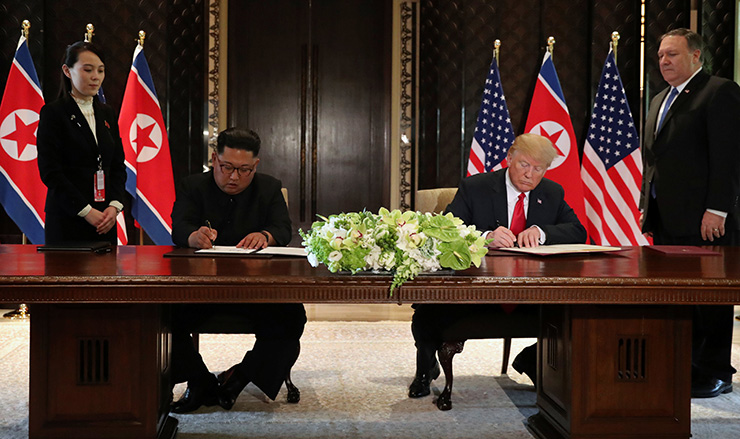
The much-awaited Trump-Kim summit finally took place, but ended up in an uncertain platform of rhetoric and ‘great expectations.’ After weeks’ of shifting (and even provocative) statements and comments, Donald Trump and Kim Jong-un came down to a ‘level playing’ diplomatic table in Singapore to break the impasse in the Korean Peninsula. Though the long-term pay-off of the summit could be a matter of differing interpretations, the joint statement issued after the meeting on 12 June is an indication that if there is a ‘strategic will’, there will be a ‘political way forward’ even in complex theatres of conflict in the world.
It was on 24 May that Trump suddenly cancelled the scheduled summit with the North Korean leader due to the “tremendous anger and open hostility.” In a letter to Kim, Trump even warned that the US nuclear capabilities were “so massive and powerful that I pray to God they will never have to be used.” This premature move of Trump came amid reports of North Korea shutting down its nuclear testing site at Punggye-ri in what was said to be the first step toward denuclearization. Observers even suspected that given Trump’s track record of pulling out from international deals such as that with Iran (Seethi 2018), the planned summit would ever take place. Yet it took place after weeks’ of uncertainty and wild conjectures.
The Joint Statement issued after the meeting noted that the two leaders “conducted a comprehensive, in-depth, and sincere exchange of opinions on the issues related to the establishment of new US–DPRK relations and the building of a lasting and robust peace regime on the Korean Peninsula. President Trump committed to provide security guarantees to the DPRK, and Chairman Kim Jong Un reaffirmed his firm and unwavering commitment to complete denuclearization of the Korean Peninsula” (US, White House 2018). Both leaders also committed “to establish new US–DPRK relations in accordance with the desire of the peoples of the two countries for peace and prosperity.” While “the United States and the DPRK will join their efforts to build a lasting and stable peace regime on the Korean Peninsula,” the “DPRK commits to work toward complete denuclearization of the Korean Peninsula” reaffirming the Panmunjom Declaration. Both leaders also committed “to recovering POW/MIA remains, including the immediate repatriation of those already identified” (Ibid). The leaders also committed “to hold follow-on negotiations, led by the U.S. Secretary of State, Mike Pompeo, and a relevant high-level DPRK official, at the earliest possible date, to implement the outcomes of the US–DPRK summit.
Given the history of the 2000 US-North Korea Joint Communiqué and the 2005 Six-Party Joint Statement, observers hardly expected anything other than a joint statement with raw commitments and unsure ideals. According to Anthony Ruggiero, a senior fellow of Washington’s Foundation for Defense of Democracies think tank, “It is unclear if further negotiations will lead to the end goal of denuclearization.” “This looks like a restatement of where we left negotiations more than 10 years ago and not a major step forward” (Holland, Kim, and Kim 2018). The joint statement does not have any reference to the sanctions and nor was there any mention of signing a peace treaty.
China hoped both countries could arrive at a basic consensus on denuclearization (Global Times, 12 June 2018). China’s senior diplomat, state councillor Wang Yi said: “At the same time, there needs to be a peace mechanism for the peninsula to resolve North Korea’s reasonable security concerns.” Russia’s deputy foreign minister said Moscow would have a positive assessment of the summit but “the devil is in the details.” According to Li Nan, a senior researcher with a Beijing-based Chinese public policy think tank, the meeting had only symbolic value. Li also noted that “There is no concrete detail on the denuclearization of the Korean peninsula and the provision of security guarantees by the United States” (Holland, Kim, and Kim 2018). Warning that “North Korea should act with caution” the Iranian Foreign Ministry Spokesman Bahram Qassemi has stressed that ‘the nature of the US government is not such that one can be optimistic about it” (Al Jazeera, 12 June 2018).
After the summit, Trump made a claim that he had forged a “very special bond” with Kim and that the relationship with North Korea would be very different in the future. “People are going to be very impressed and people are going to be very happy and we are going to take care of a very dangerous problem for the world,” Trump said. Kim was called “very smart” and a “very worthy, very hard negotiator” (The Sidney Morning Herald, 12 June 2018). Everyone knows that Trump has a personalized style of functioning (without much home-work and consultations). Recently the world has witnessed his premature overtures to China and Russia, and even the US allies in the recently held G-7 meeting had serious reservations about his stance.
North Korea knows that much needed to be done to ensure the termination of sanctions, among others, in the peace negotiation unleashed in Singapore. If Kim is “very smart,” as Trump called him, he will surely ponder over many times before undertaking any commitment to renunciation of nuclear weapons. He knows the fate of the Iran deal much more than anyone in the Asian nuclear theatre—where the vertical and horizontal proliferation have differing implications.
References
Holland, Steve, Jack Kim, Soyoung Kim (2018): “Trump, Kim agree on denuclearization, but deal seen symbolic,” https://www.reuters.com/article/us-northkorea-usa/trump-kim-agree-on-denuclearization-but-deal-seen-symbolic-idUSKBN1J72PM
Seethi, K.M. (2018): “India, Iran and the strategic Implications of the US pull out from the JCPOA,” Countercurrents, 3 June.
US, White House (2018): “Joint Statement of President Donald J. Trump of the United States of America and Chairman Kim Jong Un of the Democratic People’s Republic of Korea at the Singapore Summit, 12 June, https://www.whitehouse.gov/briefings-statements/joint-statement-president-donald-j-trump-united-states-america-chairman-kim-jong-un-democratic-peoples-republic-korea-singapore-summit/
The author is Professor, School of International Relations and Politics, Mahatma Gandhi University, Kerala. He can be reached at [email protected]









































